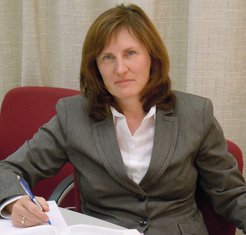New Scientific Director of Max Planck Institute for Plasma Physics
Prof. Dr. Sibylle Günter to succeed Prof. Dr. Günther Hasinger in February as head of IPP

Sibylle Günter is Professor of Theoretical Physics and has been with IPP for fourteen years now, latterly as head of the Tokamak Theory Division. Her research field is theoretical plasma physics, her main areas being magnetohydrodynamics and kinetic theory of suprathermal particles. “These are concerned with computational description of the stability of fusion plasmas – the core of future fusion power plants – and the effect that the fast helium nuclei resulting from fusion have on the plasma”, states Professor Günter. As new director, she aims to bring the two branches of IPP at Garching und Greifswald even closer together, “in order to ensure jointly the best possible use of the two large-scale experiments, viz. the ASDEX Upgrade tokamak device at Garching and the Wendelstein 7-X stellarator, which is to go into operation at Greifswald in 2014. IPP is the only institute in the world equipped to do comparative research on devices of both types, thus enabling it to develop the optimum concept for a power plant – a most exciting objective.”
Born at Rostock in 1964, Sibylle Günter graduated in physics at her home-town university in 1987 and was awarded her PhD three years later. Her subsequent studies as scientific assistant at the University of Rostock were intensified by periods of research in the USA at the University of Maryland and the National Institute of Standards and Technology. In 1996 she gained her lectureship qualification at the University of Rostock with a thesis entitled “Optical Properties of Dense Plasmas”. In the same year she joined IPP at Garching. As the then youngest female in the history of the Max Planck Society to be made a Scientific Fellow, she became head of IPP’s Tokamak Physics Division at Garching in 2000. Since 2001 she has been lecturing as Associate Professor at the University of Rostock, and since 2006 been Honorary Professor at the Technical University of Munich.
Her predecessor, Professor Dr. Günther Hasinger, born at Oberammergau in 1954, changed from astrophysics to fusion research as Scientific Director of IPP in 2008. Previously, he had been Scientific Fellow of Max Planck Institute of Extraterrestrial Physics at Garching and head of its X-ray and gamma group. Günther Hasinger is now returning to his original field of research, astrophysics: He will be heading the Astronomical Institute of the University of Hawaii, which operates on Mauna Kea the world’s largest astronomical observatory. He plans to move to Honolulu in mid-year. “In the past three years I have greatly enjoyed devoting myself to the great and challenging, but to me also completely new, field of plasma physics and fusion research at IPP”, states Professor Hasinger. “My present decision is governed by the unique chance to assume a responsible role on the international scene that is again more strongly geared to my passion for astrophysics.”
Isabella Milch
